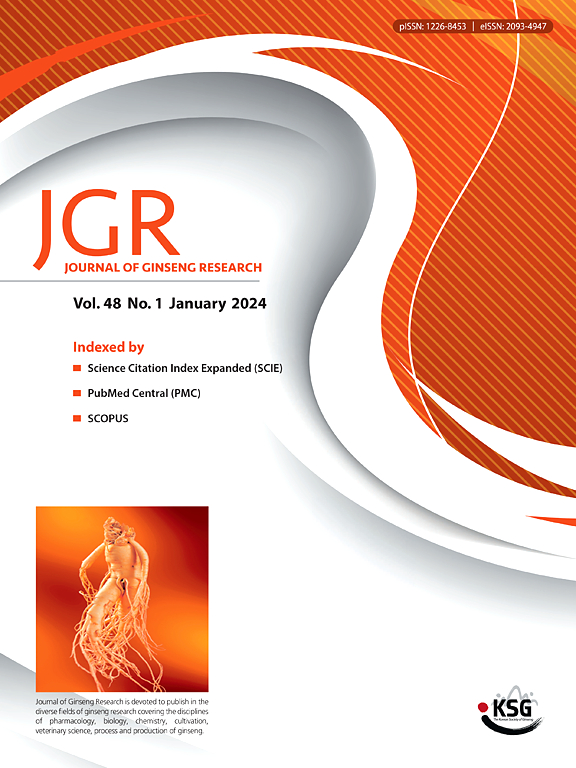The role of ginseng in aging: Insights into regulatory T cells activation and mitochondrial regulation
IF 5.6
2区 医学
Q1 CHEMISTRY, MEDICINAL
引用次数: 0
Abstract
A hallmark of aging is the progressive decline in resilience to stress and mitochondrial activity. As mitochondrial function decreases with aging, mitochondrial DNA (mtDNA) is shed under apoptotic stress, resulting in a persistent low-level of sterile inflammation (called inflammaging) that induces the aging program. In response to inflammaging, the body activates a compensatory anti-inflammatory response, including the activation of regulatory T (Treg) cells, to prevent excessive tissue damage. Recent studies have highlighted the dysfunction of Treg cells in elderly patients, suggesting that their critical role in the mitigation of aging. Additionally, mitochondrial electron transport chain (ETC) complexes, particularly complexes II and III, are essential for the function of Th1 and Treg cells, respectively. Since centenarians experience less inflammaging, this review aims to explore the anti-aging properties of ginseng. Research has shown that ginseng and its active compounds, ginsenosides, increase Treg cells population in aged mice and convert pro-inflammatory M1 macrophages into anti-inflammatory M2 macrophages. Furthermore, ginseng enhances antioxidant protein expression, decreases reactive oxygen species (ROS) production, restores mitochondrial ATP and membrane potential, and exerts anti-aging effects. Ginseng has been shown to extend lifespan, promote beneficial gut bacteria, and slow cognitive decline through its influence on immune cell circulation. Future research, including clinical trials, is needed to clarify the regulatory effects of ginseng on Treg cells, mitochondrial complexes, and their associated metabolites, as well as the interconnected mechanisms between them.

人参在衰老中的作用:对调节性T细胞激活和线粒体调节的见解
衰老的一个标志是对压力的恢复能力和线粒体活动的逐渐下降。随着年龄的增长,线粒体功能下降,线粒体DNA (mtDNA)在凋亡应激下脱落,导致持续低水平的无菌炎症(称为炎症),从而诱导衰老程序。为了应对炎症,身体会激活代偿性抗炎反应,包括调节性T (Treg)细胞的激活,以防止过度的组织损伤。最近的研究强调了老年患者的Treg细胞功能障碍,表明它们在延缓衰老中起着关键作用。此外,线粒体电子传递链(ETC)复合物,特别是复合物II和III,分别对Th1和Treg细胞的功能至关重要。由于百岁老人经历较少的炎症,本综述旨在探索人参的抗衰老特性。研究表明,人参及其活性成分人参皂苷可以增加老年小鼠的Treg细胞数量,并将促炎M1巨噬细胞转化为抗炎M2巨噬细胞。此外,人参还能提高抗氧化蛋白的表达,降低活性氧(ROS)的产生,恢复线粒体ATP和膜电位,具有抗衰老作用。人参已被证明可以延长寿命,促进有益的肠道细菌,并通过其对免疫细胞循环的影响减缓认知能力下降。未来的研究,包括临床试验,需要明确人参对Treg细胞、线粒体复合物及其相关代谢产物的调节作用,以及它们之间的相互作用机制。
本文章由计算机程序翻译,如有差异,请以英文原文为准。
求助全文
约1分钟内获得全文
求助全文
来源期刊

Journal of Ginseng Research
CHEMISTRY, MEDICINAL-INTEGRATIVE & COMPLEMENTARY MEDICINE
CiteScore
11.40
自引率
9.50%
发文量
111
审稿时长
6-12 weeks
期刊介绍:
Journal of Ginseng Research (JGR) is an official, open access journal of the Korean Society of Ginseng and is the only international journal publishing scholarly reports on ginseng research in the world. The journal is a bimonthly peer-reviewed publication featuring high-quality studies related to basic, pre-clinical, and clinical researches on ginseng to reflect recent progresses in ginseng research.
JGR publishes papers, either experimental or theoretical, that advance our understanding of ginseng science, including plant sciences, biology, chemistry, pharmacology, toxicology, pharmacokinetics, veterinary medicine, biochemistry, manufacture, and clinical study of ginseng since 1976. It also includes the new paradigm of integrative research, covering alternative medicinal approaches. Article types considered for publication include review articles, original research articles, and brief reports.
JGR helps researchers to understand mechanisms for traditional efficacy of ginseng and to put their clinical evidence together. It provides balanced information on basic science and clinical applications to researchers, manufacturers, practitioners, teachers, scholars, and medical doctors.
 求助内容:
求助内容: 应助结果提醒方式:
应助结果提醒方式:


